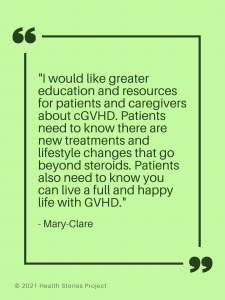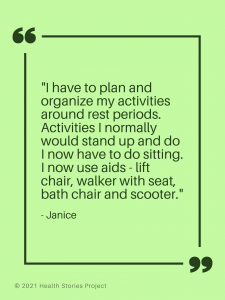Graft versus host disease (GVHD) is a condition that may occur following a transplant using donor bone marrow or stem cells. More than 20,000 people every year are diagnosed with GVHD. The chances of developing GHVD and its severity may vary between individuals. The added stress of living with GVHD after an operation is a challenge that individuals do not have to go through alone.
We asked our Health Stories Project community to share their experiences living with GVHD to help raise awareness and potentially help better educate the healthcare community about a condition that is not widely known.
Some of our community members have shared with us that they wish there was a social platform for physicians (like https://www.sermo.com/) where they could have healthy discussions on medicine, industry, and other related matters. Furthermore, they are hoping the medical community will do more to prepare transplant recipients for GVHD, how that has impacted their day-to-day lives and the things young individuals should know.
Since your diagnosis, what is something you wish the medical community could do to better prepare transplant recipients in regards to GVHD?



“Actually TALK to the patient and break the potential side effects down so that the patient understands everything clearly. I was handed a giant binder that may or may not have held all the answers to the universe, but in that position, both mentally and physically, I was not prepared or really capable to go through it much more than casually.” – Chris
“More education on different body systems that can be affected and how it presents. I had GI GVHD in first 100 days and cardiac/pulmonary GVHD after 100 days. Second episode went undiagnosed for three months due to prejudice and stereotyping of morbidly obese people as lazy. I kept being told to do more, build up my activity tolerance when I was acutely short of breath on exertion due to huge pericardial effusion. Hospitalized with insertion of substernal pericardial drain for six days after someone finally believed me when I described being unable to sit and fold a basket of towels without stopping to catch my breath.” – Anonymous
“More in depth explanation…. I learned most on social media and various searches.” – Natalie
GVHD can manifest symptoms in a number of ways that can be unique to each person. How have you had to adjust your day-to-day life?



“I have to plan and organize my activities around rest periods. Activities I normally would stand up and do I now have to do sitting. I now use aids – lift chair, walker with seat, bath chair and scooter. Everything I do takes me longer than a normal person.” – Janice
“I have had to manage my GVHD in numerous ways. My GVHD has taken primary form in my eyes. My eyes are so dry and painful that I can not longer wear contacts. I have steroid drops, serum tears, punctual plugs and sustain night ointment.” – Anonymous
What do you think newly diagnosed patients should know?
“New patients need to strongly advocate for themselves. If something doesn’t feel or seem right with their bodies or capabilities, they need to push the issue and give specific examples and not let up until the doctor hears them, takes the issue seriously and intervenes with tests or whatever it takes to diagnose and correct the problem.” – Janice
“They should know there are bad days and good days. The emotional roller coaster is real and not to be afraid to reach out and find that support group. Make your treatment team understand where you are and push to get what you feel is needed.” – Heather
“I would tell them that every journey is a BATTLE but our immune system is equipped to fight and you must believe you can win.” – Jeanette

